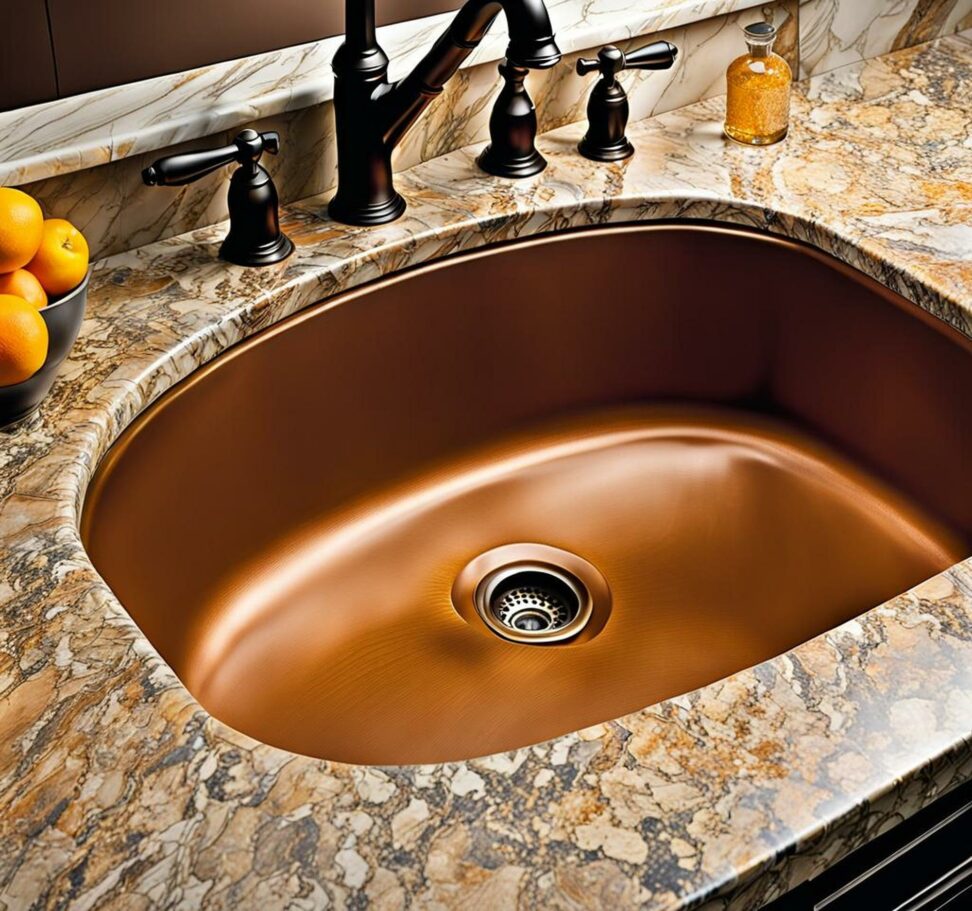Granite Composite Sink Stains? Restore Its Original Beauty Now
Granite composite sinks are valued for their stylish appearance and durability. However, like any sink material, they can become stained and discolored over time with use. While this may seem like an impossible problem to fix, there are several effective cleaning methods that can restore your granite composite sink's original beauty and luster.
We'll also provide daily maintenance tips to prevent future discoloration. With the right techniques, you can keep your sink looking like new.
What Causes Staining in Granite Composite Sinks?
Granite composite sinks are created from a mixture of granite particles and acrylic resins. While this makes them resistant to scratches, heat, and humidity compared to solid surface sinks, they can still become stained over time.
Some common causes of staining include:

- Spills from foods and beverages like coffee, tea, wine, and tomato sauce
- Accumulation of hard water or mineral deposits
- Discoloration from use of soaps, lotions or harsh cleaning products
- Heat exposure from hot pots and pans
- Scratches and abrasions that open up pores in the sink surface
- Certain lighter sink colors that show staining more easily
Granite composite contains trace amounts of iron that can cause rust-like stains when exposed to acids. Plus, when scratches occur, they open up micro-pores in the material allowing stains to penetrate deeper.
Role of Hot Water
One factor that accelerates sink stains is exposure to hot water. The heat causes the acrylic resins to expand and contract, creating micro-fissures in the surface. This allows stains to seep in and become stubbornly set.
For this reason, it's best to use mainly cool water when rinsing food debris, filling pots, or washing dishes in a granite composite sink. Hot water should be minimized.
Cleaning Methods to Remove Existing Stains
If your granite composite sink already has staining or discoloration, do not despair. There are several DIY methods you can use to effectively remove stains and restore the sink's original appearance.
Baking Soda Paste
Baking soda is mildly abrasive so it can lift stains without damaging the sink surface. Make a paste by mixing 3 parts baking soda with 1 part water. Apply the paste to stained areas of the sink, allowing it to sit for at least 15 minutes before scrubbing and rinsing clean.
Vinegar Solution
The acidic nature of vinegar helps dissolve mineral deposits, soap scum, and hard water stains. Create a cleaning solution by mixing 1 part white vinegar with 2 parts warm water. Spray the solution onto stained areas, wait 5 minutes, then scrub with a soft sponge before rinsing.
Hydrogen Peroxide
Hydrogen peroxide is another mild but effective cleaner for granite composite. It naturally dissolves stains through fizzing and bubbly action. Apply it directly to stained spots. Allow it to sit for several minutes before scrubbing and rinsing away.
Polishing Compound
For superficial stains or minor scratches, an automotive polishing compound can help buff the sink's surface to restore luster. Use a soft cloth to gently rub the compound onto affected areas using small circular motions. Reapply as needed until stains diminish.
For stubborn stains, you may need to use the polishing compound several times. Always test in an inconspicuous spot first before tackling the entire sink.
Daily Cleaning Tips to Prevent Future Stains
Once your granite composite sink looks brand new again, you'll want to be diligent with daily cleaning habits to prevent a recurrence of stains.
Promptly Clean All Spills
Don't give stains a chance to set in. Immediately blot any liquid spills with a towel. For sticky messes or food debris, use hot soapy water for quick cleaning.
Use Mild Dish Soap and Soft Sponge
Avoid abrasive scouring powders or stiff scrub brushes that could scratch your sink's surface. For daily cleaning, stick to a mild liquid dish soap and soft sponge or microfiber cloth.
Avoid Harsh Cleaners
Chemical-laden cleaners like bleach, ammonia, alcohol, or acidic solutions can damage your sink over time. Simple mild soap and water are best for routine maintenance.
Limit Use of Hot Water
As mentioned earlier, hot water can accelerate staining by creating tiny cracks in the sink material. Make a habit of using cooler water whenever possible to prevent this.
Dry Thoroughly After Each Use
Allowing water droplets to air dry on the sink's surface leads to water spots and mineral deposit buildup. Get into the habit of wiping down the sink with a towel after each use.
When to Call a Professional
For minor stains or surface scratches, the DIY methods described here should restore your granite composite sink effectively. However, if you notice any cracks, chipping, or major damage - it's best to call in a pro.
Professionals have commercial polishing equipment to minimize the visibility of scratches. They can also repair chips or seal cracks to prevent leaks. For any structural repairs, always seek expert help.
While granite composite sinks can develop stains over time, it is possible to return them to a like-new condition with some simple cleaning techniques. The keys are being attentive with prompt stain removal and establishing daily maintenance habits.
Your granite sink can be cleaned and cared for for many years. Just remember to enlist professional assistance if you ever notice cracking or other signs of damage. Addressing problems quickly keeps your sink in tip-top shape.